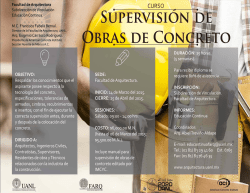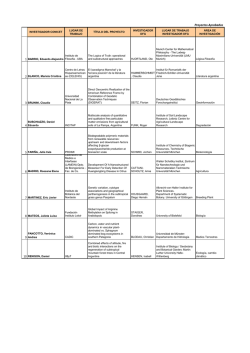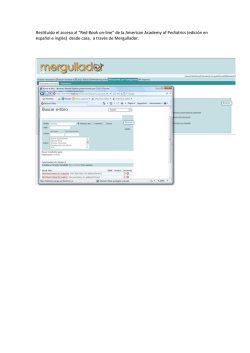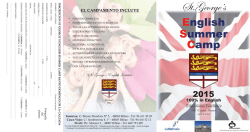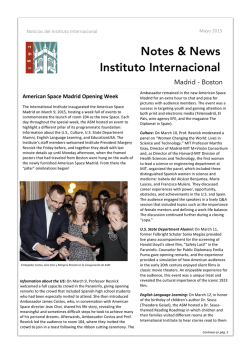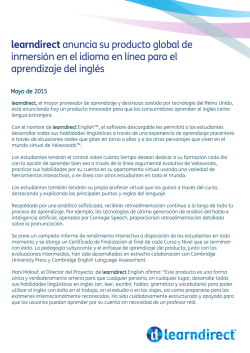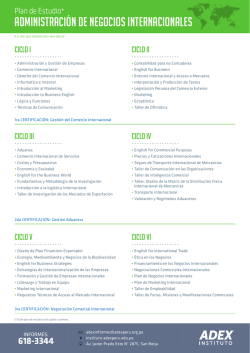
DECEMBER 2015 NEWSLETTER - Instituto Internacional
1 Notes & News Instituto Internacional Madrid - Boston Notes & News, Diciembre 2015 The American Cultural Studies Program: A New Initiative of IIE Andrew Bennett This fall saw the inauguration of a new addition to the International Institute's English Department: The American Cultural Studies Program (ACS). Boasting expert instructors dedicated to teaching advanced American English through the study of American culture, ACS represents the latest exciting manifestation of the International Institute's ongoing commitment to sharing U.S. culture and providing high quality opportunities for learning in the Madrid community. ACS includes four course: American Art History, taught by Alexa Brooks (MA, MFA); American Cinema, taught by Anita Haas; American Expression, taught by Andrew Bennett (PhD); and American Literature, taught by Chiara Luis (PhD). Each of these courses explores American culture from a unique perspective, presenting students with the chance to expand their understanding of the U.S. in a learning environment designed to replicate a U.S. university classroom, complete with the latest in educational technology. At the same time, ACS instructors incorporate the best English teaching techniques and practices, gained from years of experience in the field. As a product of this dual passion for teaching U.S. culture as well as U.S. English, ACS courses are truly a unique educational experience in Madrid. XX Womens Colloquium, Borders and Barriers: Challenges for Refugee Women in Spain and the United States Stephen Ault Rarely has the International Institute’s Coloquio anual sobre la th mujer taken up a more timely topic than this year’s, the 20 in the series, which focused on “Borders and Barriers: Challenges for Refugee Women in Spain and the United States.” Against the background of the growing crisis fueled by war in Syria, unrest in Africa, and drug cartel-‐related violence in Central America causing mass movement of populations across international frontiers, the Coloquio, held in the Paraninfo on October 30, illuminated the problems of women who attempt to seek protection as refugees. The formal launch of the program was celebrated with an open session on November 25th, in which each of the ACS instructors presented their courses for the coming trimester, and so offered a more complete idea of what makes ACS special. This event coincided with the activation of the new ACS webpage on the IIE website, where the program's vision is articulated and the courses and instructors introduced in greater detail. Guest speakers Karen Musalo, professor of law and Director of the Center for Gender and Refugee Studies of the University of California Hastings College of the Law, and Patricia Bárcena, Director of the Comisión de Ayuda al Refugiado en Euskadi, focused on both the legal and practical problems confronting women who seek asylum. And this is only the beginning. The coming year will provide ample opportunity for new ACS initiatives, potentially including workshops, guest speakers, joint seminar sessions, and a host of other possibilities. With the continued passion and dedication of its faculty, coupled with IIE's steadfast commitment to its project, there is no telling what the future holds for both the American Cultural Studies Program and the International Institute. Musalo placed the current refugee crisis in a historical context, with the contemporary approach to refugees and asylum seekers rooted in the period following World War II. While international agreements began protecting refugees who were fleeing their home countries because of mistreatment based on racial, religious, or ethnic differences, women were slow to receive protected status on the basis of gender. Musalo was instrumental in litigation that expanded the standards for granting asylum in the U.S. to include gender-‐based claims—of women fleeing from forced genital mutilation and, later, women escaping domestic violence and organized crime in Central America. Musalo suggested that the resistance to (Viene en pág.1) (Continua pág. 2) 2 Noticias del Instituto Internacional Otoño en Madrid Pilar Piñón El público madrileño encuentra en la renovada programación cultural del Instituto Internacional una oferta atractiva, variada tanto en temas como formatos y abierta a todos los segmentos de edad. Este trimestre ASM organizó actos notables en torno a los tres grandes temas alrededor de los cuales articula su programación: emprendimiento, STEM y los estudios en los EE.UU. El primero fue abordado desde dos perspectivas, las industrias creativas o culturales y el movimiento “locavore”. El fomento del acercamiento de las niñas a la ciencia y la tecnología se plasmó en la primera convocatoria del GirlsTech Camp que ya contempla, dada la excelente acogida y resultados, una nueva convocatoria en los próximos meses. Dentro de los actos centrados en los estudios en los EE.UU. destacan la Feria de Universidades y la Semana de la Educación Internacional con paneles, talleres y charlas tales como “Ask the Educational Adviser”, “Application Clinic” o “ Your 5 Steps to US Presentation” destinados a facilitar información y formación para acceder a los estudios universitarios en EE.UU. Estos actos son un excelente complemento al Programa Pathways del Instituto Internacional. Entre el resto de actividades sobresalen encuentros, en distintos contextos, con destacadas escritoras españolas como Elvira Lindo, Marta Sanz o Belén Gopegui. También la poeta Marilyn Hacker ofreció una lectura de sus poemas dentro del ciclo dedicado a poetas norteamericanos contemporáneos iniciado el curso pasado. Las relaciones España-‐EE.UU. y su estudio desde la perspectiva histórica fue el tema central del “Seminario España-‐Estados Unidos: una historia compartida” organizado por el Instituto en colaboración con el Instituto Franklin de la Universidad de Alcalá y el Consejo Superior de Investigaciones Científicas. También en este otoño y con motivo de la participación en la XII Semana de la Arquitectura del Colegio de Arquitectos de Madrid, el Instituto abrió sus puertas a varios cientos de madrileños que pacientemente hicieron cola a la puerta del edificio para tener la oportunidad de conocer su interior e historia. La programación orientada al público infantil y juvenil encuentra en el Instituto un gran aliado. Este buen entendimiento y sintonía no solo contribuyen a renovar el público del Instituto, sino que también apoyan el crecimiento del Programa de Inglés para Niños y Jóvenes y está favoreciendo la progresiva construcción de una comunidad de padres, alumnos y educadores fieles a las actividades infantiles y juveniles de la biblioteca. Diciembre 2015 (Viene pág.1) extending refugees protection for gender-‐based causes derives from fear of an avalanche of asylum claims. Patricia Bárcena of CEAR-‐Euskadi described working to defend refugee rights, accompanying those who make it to Spain through the legal process and the difficulties of resettlement. The effort to help refugees fleeing from violence to reach a safe zone is complex, she explains, for during their typically long treks to new homes, they commonly suffer more violence, with sexual exploitation along the way a high risk for girls and women. Abuse from non-‐state agents is a common risk for this vulnerable population as they flee the conditions prevailing in their countries of origin. While Spain may be seen as a safe harbor for refugees, with a Constitution consistent with international protections for human rights, Bárcena noted that it is also a major consumer of sex trafficking, which can lead to more gender-‐based dangers. Organized by moderator Prof. Linda Gould Levine of Montclair State University, Prof. Margery Resnick of MIT, and Pilar Piñón, Executive Director of the International Institute, the Coloquio attracted a large audience whose questions for the speakers expressed divergent views of the refugee crisis, especially the massive flight of Syrians to Europe. Both Karen Musalo and Patricia Bárcena urged sympathy for refugees, who are so desperate to escape the horrors of their home countries that they will take on the multiple dangers, even risk of death, to reach a safe place. Comienza un nuevo semestre Pilar Piñón El semestre comenzará con la llegada de los grupos de MIT el 4 de enero y a partir de entonces, a lo largo del mes irán incorporándose Stanford, Hamilton College, SUNY, Boston University, USC y Syracuse University. En total el Instituto espera unos trescientos universitarios norteamericanos que se suman a los casi cuatrocientos españoles que comenzarán sus clases de inglés a partir del 11 de enero. En enero están previstas estas actividades: 15 de enero -‐ Concierto de Año Nuevo de ADANAE 18 de enero -‐ English Reading Circle (Poetry) 19 de enero -‐ English Reading Circle (Short Story) 26 de enero – Cine Foro sobre cine americano 28 de enero -‐ Club de Lectura en español 29 de enero -‐ Tiny Music and Movement Time y Readers’ Theater (Kids & Adults) 30 de enero -‐ Library Story Telling Mornings 2 1 2 Noticias del Instituto Internacional Diciembre 2015 From the President I want to extend wishes for Happy Holidays and a healthy and successful New Year to all members of the International Institute in Spain community. th As the International Institute heads into its 124 year, we can reflect on the continuity of the Institute’s mission since it was established in 1892. From the outset, the International Institute has been dedicated to education and cultural exchange between the United States and Spain, with its original focus on advancing the cause of education for women and girls in Spain. Today, the women’s colloquium recognizes the fundamental role that raising issues of interest to women has played throughout the organization’s history. The Institute’s educational functions are embodied today in its American English and culture program, which has recently inaugurated an American Cultural Studies program unique in Madrid. The International Institute also continues to welcome study abroad students from American colleges and universities as it has done since the first group from Smith College arrived in 1930. The Institute is also promoting higher education in the U.S. for Spanish students through its Pathways to the American University program. The Library, always central to the Institute’s activities, remains an extraordinary intellectual resource as well as a vibrant center of activity for a wide public drawn by English and Spanish reading groups for adults, Saturday morning storytelling sessions for children, readers’ theater events for children and adults. Our Librarians Nuria Seguí and Ana Alonso have undertaken the immense task of removing thousands of long-‐unused items from the Library depósito. We are developing a fundraising plan to permit the Institute to reinvent the space as a contemporary, American-‐style children’s library, which will enable us to expand the collections for children and youth readers, who are among the most active users of the Library and represent the most rapidly growing segment of the Institute English Program. The Institute’s ability to promote exchange between the U.S. and Spain has been enhanced by the presence of the American Space Madrid, a collaboration between the Institute, the oldest American cultural entity in Spain, and the U.S. Embassy, Madrid. This venture has brought STEM activities for girls, presented noted speakers like Arianna Huffington, supported the Coloquio de la mujer, and recently mounted a program on the locavore food movement featuring chefs from Brooklyn and Madrid as well as a farmers’ market in the Institute garden. The many events offered in conjunction with the American Space Madrid have attracted thousands of visitors to the Institute over this year. The International Institute’s all-‐volunteer Board of Directors and I thank all the members of the core group who have made carrying on the Institute’s tradition possible during this year: Executive Director Pilar Piñón; former English Program Director Patti Trimborn; Librarians Seguí and Alonso; American Space Director Jean Choi; American Cultural Studies coordinator Andrew Bennett; Administrative Assistants María José Lastra, Marián Cortés, and Ana Rueda; Facilities Manager Juan González; Café manager Juan López; porteros Andrés Fernández and Victor Martínez; cleaning staff Trinidad Almanso, María del Mar Ortega, Teresa Zabaleta, Isabel Falquina y Nuria Yubero. We also extend our appreciation to the English Program Faculty. Lastly, I thank those who have made donations to the International Institute in 2015. The Institute and its historic building at Miguel Ángel, 8 are the results of generous charitable giving by Americans who wanted to bring educational innovation to Spain. Today’s International Institute, a 501(c)(3) organization, still relies on the donations of those who support its mission of educational and cultural exchange. We welcome your contributions, too, so that the International Institute can uphold its traditions in the New Year and beyond. Sincerely, Margery Resnick 3 2 1 Noticias del Instituto Internacional Diciembre 2015 Una conversación con Juan González Jean Choi/Pilar Piñón Esta sección la dedicamos a presentar a las personas que hacen posible la labor diaria del Instituto. En ediciones anteriores de N&N dedicamos este espacio a María José Lastra, el miembro de más antigüedad del equipo madrileño. Fue seguida por Nuria Segui bibliotecaria del Instituto desde 1986. Ahora es el turno de Juan González. Juan González es probablemente la persona más fotografiada en el Instituto y sin lugar a dudas la que ha asistido a más eventos. Además conoce como nadie los secretos del edificio al que ha dedicado treinta años de su vida. Juan se incorporó al Instituto Internacional en 1985 como portero del turno de tarde. Siempre ha vivido en Madrid, donde nació y muchos reconocerían en él la sobriedad y seriedad que caracterizan a las gentes de Castilla. Tiene dos hijos, Elizabeth que es arquitecta y Álvaro que continúa estudiando. razón por la que si tuviera que pasar un tiempo en una isla desierta se llevaría, nos dice, una tienda de campaña, una cámara fotográfica, revistas del m otor y una navaja. A lo largo de estos treinta años ha ido sumando nuevas tareas y responsabilidades a sus funciones iniciales hasta convertirse en un verdadero experto en el edificio del que conoce todos sus entresijos. Un día perfecto en el mes de enero para Juan es uno que transcurre en la montaña e incluye una gran nevada. La última pregunta que le hemos hecho es ¿cuáles son tus deseos para el año nuevo? Y su respuesta: “seguir como estoy”. Juan ha sido testigo en estas tres décadas de muchos acontecimientos en la vida del Instituto y desde su punto de vista los cambios más importantes que ha experimentado la institución tienen que ver con la modernización tanto del edificio como de la gestión de la institución. Algunas novedades en el edificio En su trabajo disfruta especialmente de la variedad de actividades que realiza y del estímulo diario que supone dar respuesta a los grandes y pequeños retos que se presentan. Entre ellas Juan destaca su participación en los actos como responsable de los medios audiovisuales y la interacción con los conferenciantes y el público, que hace de esa experiencia una muy variada. Por todo ello el Paraninfo es su lugar favorito en el Instituto. Su mayor reto a día de hoy fue aprender informática. A partir de aquel breve curso que tomó en los años noventa sobre “informática de gestión”, Juan ha continuado formándose por su cuenta y es en la actualidad la persona que a todos ayuda. Pilar Piñón El Paraninfo, uno de los lugares más emblemáticos y queridos del edificio, está de estreno. La histórica pantalla de proyección, incapaz ya de ocultar arrugas y grietas, ha sido reemplazada por una nueva gracias a la financiación canalizada a través de American Space. Esta magnífica pantalla no solo aumenta sustancialmente las calidad de la proyección sino que embellece de forma evidente el aspecto del Paraninfo en su conjunto. Por otra parte, en la biblioteca se ha reorganizado el mobiliario de la zona de revistas. La hemeroteca, recientemente integrada en la sala de lectura del jardín, cuenta así con un espacio muy atractivo y que invita a disfrutar de la lectura. Desde muy joven ha tenido gran afición por la fotografía, interés que se ha plasmado, por ejemplo, en la realización de detallados reportajes fotográficos de las obras de reforma del Instituto de manera que se conserva un magnífico de fondo imágenes de todas las intervenciones realizadas desde 2002. Otro de sus intereses son los coches, 4 1 2 Noticias del Instituto Internacional Diciembre 2015 The ASM's First Girls Tech Camp 2015 continuing the positive STEM-‐centric energy of this program and welcoming 28 new young girls and their families to the Institute’s community. Jean Choi The American Space Madrid organized and hosted US Embassy Madrid’s first GirlsTech Workshop series from October 6, 2015 to December 16, 2015. Designed as an afterschool STEM (science, technology, engineering, mathematics)-‐based makerspace camp for 28 girls in the 11 – 14 year old age bracket, GirlsTech offered six workshops with facilitators from Camp Tecnológico, the same group that previously organized makerspace events at the ASM. Over 600 parents signed up and/or inquired about GirlsTech for their daughters, yet only the first 28 who signed up were eligible to join the series. Split into two groups, “Cambridge” and “Silicon Valley,” the selected students met in the American Space Madrid on either a Tuesday or Wednesday for 90 minutes every two weeks. They engaged in the following activities: 1. 2. 3. 4. 5. 6. El Programa inglés para de Niños y Jóvenes sigue creciendo Video game design via “Scratch,” a free online coding program developed in MIT. “Makey Makey,” an engaging circuit board with applications that allow communication between virtually any object and a computer. Web page design via the free program “WebMaker.” Creation of multimedia stories using free web applications “Pixl” and “Popcorn.” Circuit-‐play via “Littlebits,” electronic building blocks for creating inventions involving sound, lights, and movement. Advanced “Scratch” workshop. Pilar Piñón Este trimestre el Programa de Inglés para Niños y Jóvenes es noticia por las buenas cifras de matrícula. Este programa se compone de cursos de inglés general para edades comprendidas entre los 6 y los 16 años, el Campamento Urbano de Verano, Summer in the City, ofrecido en los meses de junio y julio y el Kids’ Club, para niños igualmente, en este caso procedentes de familias biculturales. Dentro del Programa de Lengua y Cultura Norteamericanas, es la línea de actividad que ha experimentado mayor crecimiento en el trimestre de otoño lo que le ha permitido conseguir un salto cuantitativo con respecto a los niveles de años anteriores. Este crecimiento se ha experimentado tanto en los tradicionalmente exitosos grupos de los sábados, como en los cursos del resto de la semana. Merece la pena destacar este éxito ya que se da en un contexto de creciente competencia. Cabe pensar que a todo ello han contribuido, entre otras razones, la amplia programación de actividades en inglés para niños, la satisfacción de las familias con el reciente Campamento Urbano y la dedicación tanto de las organizadoras de las actividades como del profesorado. The original goal of GirlsTech was to engage the participants with innovative technology-‐based programs in the hopes of planting STEM seeds. While time will reveal if that goal is reached, the most immediate result has been that the two teams quickly became mini-‐ communities that openly engaged with STEM themes in fun and interactive ways. Each session, the students arrived with high energy and a tangible excitement. At the end of the workshops they filled out surveys which unsurprisingly reflected their interest and enjoyment. On December 16, 2015, after the final session, all the camp participants and their family members were invited to a closing ceremony in which they heard inspirational speeches from three women working professionally in science and Counselor for Public Diplomacy from US Embassy Madrid, Emilia Puma, before receiving certificates of completion. Expressing happiness but also a disappointment over the finish of their camp, the GirlsTech members took a group photo in the Institute’s main staircase before saying goodbye. Relación de imágenes en este número: Pág.1: Karen Musalo, Linda Levine y Patrícia Bárcena, Coloquio sobre la Mujer Pág.3.: Grupo “Cambridge” de participantes del Girls T ech C amp. Pág.4: Juan Gozález en el Paraninfo. Pág.5: Participantes del Girls Tech Camp. Pág. 6: Andrew Bennett con los participantes del ERC. We hope to initiate a second GirlsTech camp in the upcoming spring season. We are looking forward to 5 1 2 Noticias del Instituto Internacional Balance del English Reading Circle, el club de lectura en inglés cumple diez años Ana Alonso y Nuria Segui No es extraño que una biblioteca ofrezca entre sus actividades de animación cultural un club de lectura pero sí es peculiar que se desarrolle sobre lecturas anglosajonas en inglés y que el coloquio se realice en ese idioma. Que además se haya iniciado en el 2005 y que diez años más tarde siga activo nos permite decir que nuestro English Reading Circle (ERC) es una actividad pionera y singular. Una de las características y punto fuerte de nuestros clubs de lectura (actualmente tenemos tres en marcha) es que contamos con un experto en literatura como moderador de la sesión (en los dos en inglés además son nativos norteamericanos), que presenta la obra y facilita el que pueda haber temas interesantes a debatir. Esta presentación y análisis de las obras del ERC actualmente se publica en la página web del Instituto y se envía como adelanto a los inscritos en la sesión. A lo largo de estos años entre los facilitadores del ERC ha habido personal del programa de Boston University en Madrid como Leah Berk o Grecia Álvarez, miembros de la Junta del Instituto como Soledad Fox y profesores del departamento de inglés del Instituto como Nancy Crews, Tracy Wood, Peter Saviano, Chiara Luis o Andrew Bennett. Este último dirige la actividad desde hace tres cursos (apoyado en ocasiones por Chiara). El acierto en la selección de obras, la capacidad de fomentar la participación y sobre todo hacer pensar y analizar han sido rasgos comunes a todos ellos. Las lecturas empezaron siendo clásicos contemporáneos como “Death of a Salesman” de Arthur Miller o “The call of the Wild”de Jack London y acabaron combinándose con autores más modernos Diciembre 2015 como Nicole Krauss o Paul Auster (son nueve autores por curso). Al inicio se combinaban escritores anglosajones de distintos países pero hemos acabado orientando las lecturas específicamente hacia la literatura estadounidense, que es la cultura que desde el Instituto queremos fomentar. Este curso incluimos una selección de autoras estadounidenses de la altura de Alice Walker, Lorrie Moore, Leslie Marmon Silko, Kate Chopin, o Susan Glaspell. La constatación de que cada vez era más complicado para los participantes conseguir el libro y traer la lectura de la novela completada (y como consecuencia realizar un coloquio más exhaustivo e interesante sobre la obra) nos animó a cambiar las lecturas por relatos cortos en el curso 2009-‐2010. Comenzamos utilizando la antología de “The Best American Short Stories” de la editorial Houghton Mifflin, pero en nuestro afán de facilitar la participación de los interesados decidimos al curso siguiente pasar a utilizar relatos que estuvieran disponibles gratuitamente a través de internet. La calidad de muchas obras de este género es tan grande como la de las buenas novelas y el análisis puede ser más elaborado en una obra corta. Con la llegada de los relatos cortos incorporamos también el formato de asignación de roles de análisis entre los participantes al debate de forma que la intervención estuviera repartida. El planteamiento de las actividades en inglés de la biblioteca, entre las que se encuentra el ERC, es que sirvan de acercamiento lúdico a la cultura americana a través de la lectura y/o la literatura pero sin la profundidad y seguimiento que tendría un curso. La facilidad para poder asistir ocasionalmente hace que la rotación de participantes sea alta y permite que puedan incorporarse nuevas personas de forma que el grupo de interesados siga creciendo. Junto con su nuevo hermano, el “English Reading Circle on Poetry”, esperamos que el tiempo siga pasando por esta actividad y que pueda seguir enriqueciendo la vida de los lectores. 6 Noticias del Instituto Internacional Diciembre 2015 International Institute Foundation in Spain Board of Directors Administration in Madrid: President: Margery Resnick Executive Director: Pilar Piñón Vice-‐President: Raquel Halty Acting English Program Director: Pilar Piñón Clerk: Thomas M. Hotaling Librarians: Nuria Seguí Treasurer: Francis V. Lloyd III Ana Alonso Corresponding Secretary: Theresa Tobin Facilities Manager: Juan González Member-‐at-‐Large: Urbain DeWinter Administration: María José Lastra English Office Manager: Marián Cortés Directors: Karen Arenson Stanley Brandes Linda Gould Levine Martha Gray American Space Director: Jean Choi Álvaro Mendiola Susan L. Solomont Nicolás Wey-‐Gómez Business Manager: Michael A. Diorio Liaison to the Board: Stephen K. Ault Contributions, comments and suggestions may be sent to the International Institute: Michael A. Diorio, 11 Calvin Drive, Milford, Massachusetts 01757, U.S.A. Pilar Piñón, Instituto Internacional, Miguel Ángel, 8, 28010 Madrid, Spain or by email: [email protected] The International Institute in Spain is a 501 (c)(3) Massachusetts charitable corporation organized in 1892. 7
© Copyright 2026
